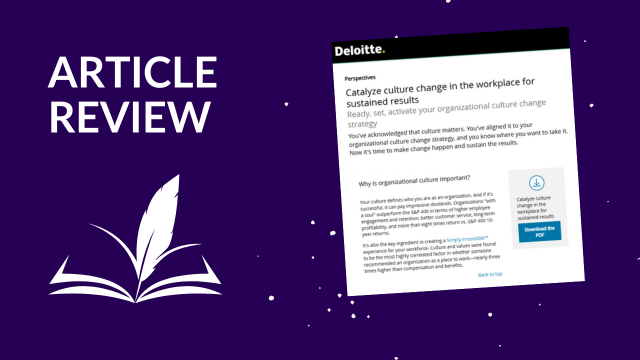While Marcel Schwantes wrote his article for those seeking to influence their managers, (5 Things Exceptional Employees Love to Do (and Toxic Employees Hate) offers some powerful insights for how change practitioners – whether internal or external – can strengthen their influence with the sponsors that they support. He refers to it as “leading up.” Important to note before you read any further, leading up isn’t “kissing up,” and will only work if you are already in a position of influence with the sponsor.
Here, briefly, are the author’s five practices of successfully leading up.
- “Take things off their plate.” This can be a tricky one for change practitioners. We cannot be pseudo-sponsors. That said, If we are intentional about observing how our sponsors are investing their time, we can often identify work—whether or not directly associated with the change—that can be delegated to others. The added advantage of doing so, we are helping them to free up time that they can then dedicate to the change.
- “Connect with your (sponsor).” You may need to initiate this connection, and that’s okay. If the sponsor doesn’t really know you, it is unlikely that they will be open to the more difficult messages that you inevitably have to deliver. And, to say connected, it is important that you remain supportive, even when you disagree with decisions that have been made. “Given that decision, I will do everything in my power to help make the change successful.”
- “Be tactful in your timing and approach. When you can make the right move at the right time with the right motive, you’re leading up. This requires the crafty skill of feeling out the atmosphere, reading your boss’s mood well, and knowing when to push and when to back off.”
- “Anticipate your (sponsor’s) needs.” As experienced change practitioners, this can be a relatively simple practice to put in place with sponsors we are in a position to influence. We know what they need to be successful in their roles.
- “Offer wise counsel.” Skilled practitioners know that such counsel is different at different levels of the organization. At lower levels, our counsel tends to be tactical in nature; supervisors and managers are executing strategy, not defining it. However, as you move into the levels of more senior executives, your real value will come with offering, as appropriate, both tactical and strategic counsel. Your understanding of what will truly be required to succeed with difficult change initiatives can be the deciding factor on whether, and/or how, sponsors proceed with a change.
Schwantes’ five practices for leading up can make a significant difference in the level of influence we have in our roles; greatly increase our sponsors’ (and change initiatives’) probability of success; and give us a much richer sense of professional fulfillment than we would otherwise experience.







